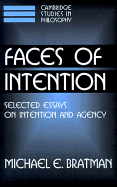Book contents
- Frontmatter
- Contents
- Acknowledgments
- 1 Introduction: Planning Agents in a Social World
- PART ONE ACCEPTANCE AND STABILITY
- 2 Practical Reasoning and Acceptance in a Context
- 3 Planning and Temptation
- 4 Toxin, Temptation, and the Stability of Intention
- PART TWO SHARED AGENCY
- PART THREE RESPONSIBILITY AND IDENTIFICATION
- PART FOUR CRITICAL STUDIES
- Index
4 - Toxin, Temptation, and the Stability of Intention
Published online by Cambridge University Press: 18 December 2009
- Frontmatter
- Contents
- Acknowledgments
- 1 Introduction: Planning Agents in a Social World
- PART ONE ACCEPTANCE AND STABILITY
- 2 Practical Reasoning and Acceptance in a Context
- 3 Planning and Temptation
- 4 Toxin, Temptation, and the Stability of Intention
- PART TWO SHARED AGENCY
- PART THREE RESPONSIBILITY AND IDENTIFICATION
- PART FOUR CRITICAL STUDIES
- Index
Summary
INSTRUMENTALITY RATIONAL PLANNING AGENCY
We frequently settle in advance on prior, partial plans for future action, fill them in as time goes by, and execute them when the time comes. Such planning plays a basic role in our efforts to organize our own activities over time and to coordinate our own activities with those of others. These forms of organization are central to the lives we want to live.
Not all purposive agents are planning agents. Nonhuman animals who pursue their needs and desires in the light of their representations of their world may still not be planning agents. But it is important that we are planning agents. Our capacities for planning are an all purpose means, basic to our abilities to pursue complex projects, both individual and social.
Why do we need to settle on prior plans in the pursuit of organized activity? A first answer is that there are significant limits on the time and attention we have available for reasoning. Such resource limits argue against a strategy of constantly starting from scratch – they argue against a strategy of never treating prior plans as settling a practical question. A second answer is that our pursuit of organization and coordination depends on the predictability to us of our actions. Coordinated, organized activity requires that we be able reliably to predict what we will do; and we need to be able to predict this despite both the complexity of the mechanisms underlying our behavior and our cognitive limitations in understanding those mechanisms.
- Type
- Chapter
- Information
- Faces of IntentionSelected Essays on Intention and Agency, pp. 58 - 90Publisher: Cambridge University PressPrint publication year: 1999
- 15
- Cited by



